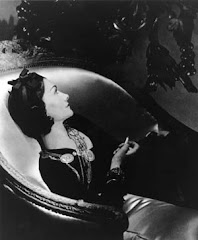A friend of mine has been sending me some wonderful emails on the perils of menswear. He has written about the male mutton-dressed-as-lamb conundrum, and the difficulties of 'smart-casual' in the business environment - a sea of boring men in pressed jeans and polo shirts. Not to mention his early teenage forays into clothes buying in Swinging London.
I have invited him to come over as an occasional guest contributor. Among his long list of increasingly feeble excuses has been his contention that no-one would be interested.
So do we have any takers for a column from a well-dressed but cool Englishman of a certain age?
Record your responses below and I'll pass them on.
UPDATE
The gentleman in question has moved an inch or two, having sent me a list of possible pseudonyms, but has now pissed off abroad for a few days. I will update you when I hear more. All I can say is, it will be worth the wait.
Sunday, 25 May 2008
An appeal to my readers
Posted by
Linda Grant
at
14:12
27
comments
![]()
![]()
![]()
![]()
Labels: about the site, Menswear
So tell me . . .
Betty Jackson says:
'I still think that clothes look better on thin people. I'm sorry, that's the truth. They look better in a size eight and ten than they do in a 16 and 18.'
Do we disagree?
Posted by
Linda Grant
at
10:59
30
comments
![]()
![]()
![]()
![]()
Labels: Opinions
It's not a love story

Ripped off from Norm, who spotted it first, this very telling insight from David Baddiel, about Jane Austen, summing up my disgust at the recent biopic (not to mention the increasingly Mills and Boonish quality of film adaptations of her work.
I first read Austen as a teenager, given Nothanger Abbey as an O level set text. I did not much enjoy it, unable to appreciate at such a young age, what Baddiel so effectively describes. I am not, like Norm, a Janeite, but Baddiel's assessment of her as the firs modernist, will take me back there, right now:
However, the great writer who has really been portrayed this way most frequently in recent times is one who hasn't yet been visited by the jaunty Gallifrean: Jane Austen. Both in the film Becoming Jane and the TV movie Miss Austen Regrets, Austen was depicted as a waspish cynical tomboy, clever with words if not so clever with men: a sort of Regency Sue Perkins. In the TV movie, there was a greater stab at complexity, as the character grew bitter with age - an Elizabeth Bennett who never nabs Mr Darcy - but in both there was, I would hazard, an incipient underlying sexism, based on the notion that Austen's work was underpinned by her own failures in love.
Because here's the thing about Jane Austen. She was a very great genius. She is possibly the greatest genius in the history of English literature, arguably greater than Shakespeare. And her achievement is not that much to do with love, although that was her subject matter. It's to do with technique. Before her there are three strands in English fiction: the somewhat mental, directly-reader-addressing semi-oral romps of Nashe and Sterne and Fielding; the sensationalist Gothic work of Horace Walpole and Ann Radcliffe; and the romances of Eliza Haywood and Fanny Burney.
However great these writers are, none could be read now and considered modern. When Austen gets into her stride, which she does very quickly with Sense and Sensibility, suddenly, you have all the key modern realist devices: ironic narration; controlled point of view; structural unity; transparency of focus; ensemble characterisation; fixed arenas of time and place; and, most importantly, the giving-up of the fantastical in favour of a notion that art should represent life as it is actually lived in all its wonderful ordinariness. She is the first person, as John Updike put it: “to give the mundane its beautiful due”, and her work leads to Updike as much as it does to George Eliot.
I have no idea how a mainly home-educated rector's daughter came by all that, but I know that imagining her as a kind of acerbic spinster flattens out this genius. It becomes all about the subject matter and not at all about the huge creative advance her work represents.
Posted by
Linda Grant
at
09:51
3
comments
![]()
![]()
![]()
![]()
Labels: Literature
Gay or grey

Let me very firmly indeed declare myself on the side of the author, here:
I look dreadful with both white hair and blonde hair. I am a dark-haired woman. And so shall remain.
And there's the rub. Women will admire Anna Ford and the rest of the glamorous grey brigade, but they will hesitate to follow suit. We don't want to go grey because of ageist prejudice, but the guilty secret is that many of us are scared we haven't got the cheekbones or the chutzpah to carry it off. My suspicion - and OK, it's deeply unsisterly - is that some women are happy to turn silver because they know they still look hot; it's not so much authentic ageing as a subtle assertion of superiority.
The other problem about grey hair is that it is such a high-maintenance option. You don't have to get your roots retouched every five minutes, but if you want to stay fabulous, the rest of your grooming has to rise exponentially. Flawlessly styled hair, immaculate clothes and perfect make-up are indispensable, as is a trim figure.
Posted by
Linda Grant
at
09:07
14
comments
![]()
![]()
![]()
![]()
Labels: Face body hair
